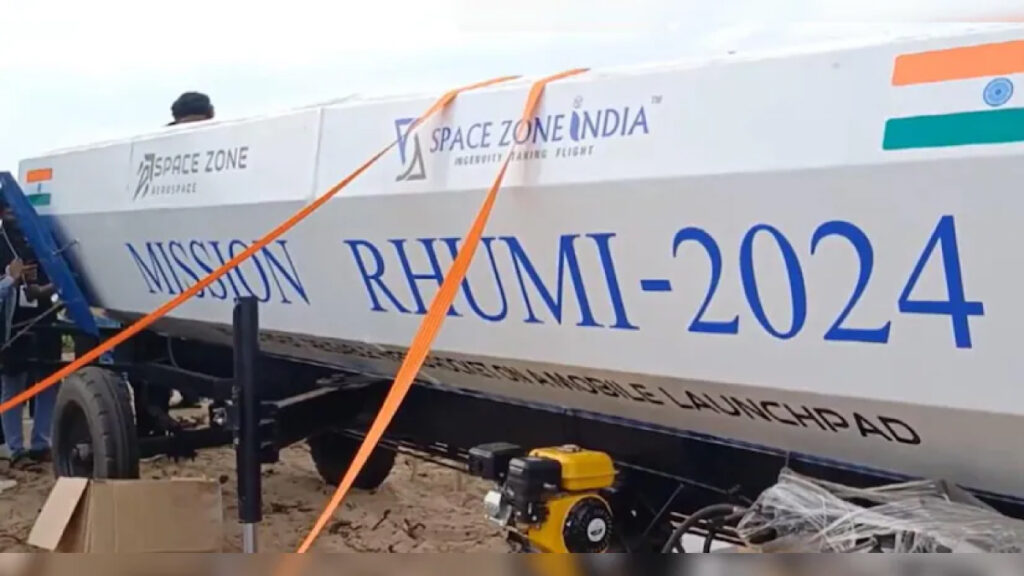Mission RHUMI-2024: A New Era in Space Technology
In a groundbreaking achievement for India’s space technology sector, Tamil Nadu-based startup Space Zone India successfully launched the country’s first reusable hybrid rocket on Saturday, August 24, 2024. The mission, dubbed RHUMI-2024, took flight from Thiruvidanthai on the East Coast Road near Chennai, utilizing a mobile launch platform. This innovative rocket is designed to conduct research on global warming and climate change, signaling a new era in sustainable and cost-effective space exploration.
The RHUMI-2024 Rocket: Design and Features
Launch Details:
– The RHUMI rocket, standing 3.5 meters tall, was launched at approximately 7:25 AM, slightly later than the initial 7:00 AM schedule.
– Powered by a generic-fuel-based hybrid motor and equipped with an electrically triggered parachute deployer, the rocket demonstrates Space Zone India’s commitment to eco-friendly and efficient space technologies.
Hybrid Propulsion System:
– The RHUMI-2024 mission represents a significant leap forward in rocket technology, combining liquid and solid fuel propellant systems.
– This hybrid approach aims to enhance efficiency and reduce operational costs, making space missions more accessible and sustainable.
– Advanced materials such as carbon fiber and glass fiber are used in the rocket’s design for durability and performance.
Reusability Feature:
– After reaching an altitude of approximately 35 kilometers, the rocket is designed to return to Earth for recovery and reuse, a game-changer in reducing space exploration costs.
Payload and Research Focus
Satellites Deployed:
– The mission’s payload included three CUBE satellites and 50 Pico satellites.
– These satellites will monitor and collect data on various atmospheric conditions, such as cosmic radiation intensity, UV radiation, air quality, accelerometer readings, altitude, and ozone levels.
Research Goals:
– The data gathered will contribute to understanding environmental dynamics and support research on global warming and climate change.
Key Statistics
– Altitude Achieved: 35 kilometers
– Payload: 3 CUBE satellites and 50 Pico satellites
– Rocket Height: 3.5 meters
– Launch Inclination: 70 degrees due to heavy winds (compared to the standard 89 degrees)
Impact on the Tamil Nadu Startup Ecosystem
– Regional Growth and Innovation:
– The successful launch of RHUMI-2024 highlights the growing capabilities of Tamil Nadu’s aerospace startups, demonstrating that local companies can compete on a global scale with cutting-edge technologies.
– This achievement is expected to attract more investment and talent to the region’s startup ecosystem, particularly in deep tech and aerospace sectors.
– Collaborations and Partnerships:
– The collaboration between Space Zone India and larger corporations like the Martin Group of Companies underscores the potential for successful partnerships that provide startups with essential resources and support.
– Alignment with National Goals:
– The mission aligns with India’s broader goals of expanding space capabilities and promoting the ‘Make in India’ initiative, contributing to technological self-reliance and new export opportunities in the aerospace sector.
Conclusion
The successful launch of Mission RHUMI-2024 by Space Zone India marks a significant milestone in India’s space technology sector. As the country’s first reusable hybrid rocket, it highlights the innovative capabilities of Tamil Nadu’s startup ecosystem and paves the way for more sustainable and cost-effective space exploration. With a focus on environmental research and advanced technology, RHUMI-2024 not only advances India’s space ambitions but also contributes to global efforts in understanding and addressing climate change. As Space Zone India and other regional startups continue to push the boundaries of space technology, the Tamil Nadu startup ecosystem is poised to play a crucial role in shaping the future of aerospace.

